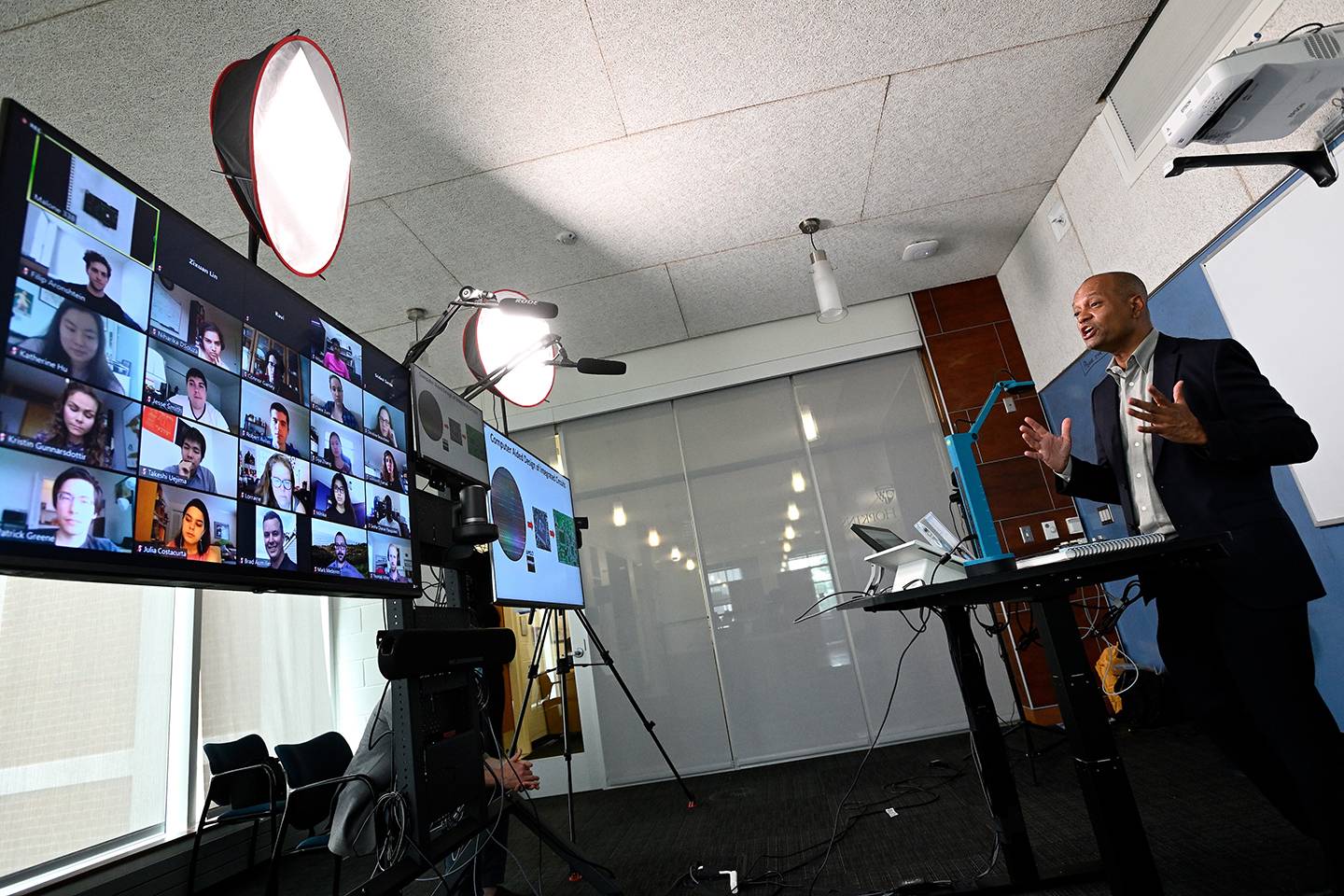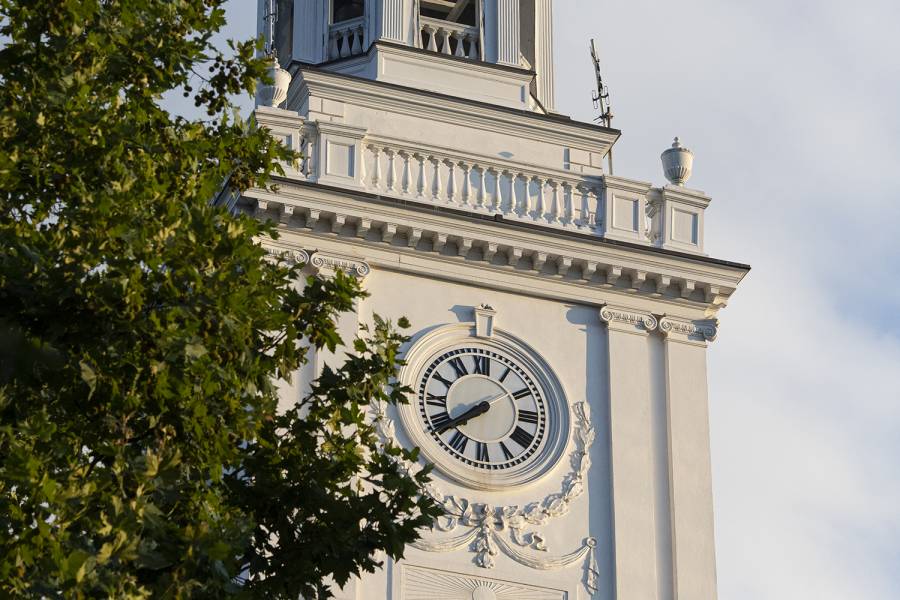Citing a concerning resurgence in COVID-19 infections and related public health trends, both in Baltimore and across the nation, Johns Hopkins University announced today that it now plans for all undergraduate instruction, labs, and co-curricular activities to be held online for the duration of the fall semester.
In considering whether to have students return to campus for the coming semester, JHU weighed health and safety as the paramount concerns, university leaders said
"Our faculty, staff, and students, including your colleagues on the Student Advisory Committee, have worked tirelessly over the past several months to explore and develop multiple options for a safe return," JHU President Ronald J. Daniels, Provost Sunil Kumar, and Vice Provost for Student Affairs Alanna?Shanahan wrote in a message sent to undergraduate students today. "Unfortunately, the pandemic is clearly worsening. We are experiencing a second surge in cases in our region and in other areas of the country."
As was the case in the spring, a small number of undergraduate students may be granted permission to live in campus housing if they can demonstrate hardship associated with distance learning. These students will take?their?classes online, and?all other campus facilities will?remain?closed to undergraduates. Students who were planning to live off campus are being urged to stay home and cancel any plans to return to Baltimore out of concern for their safety and that of the community. Nearly a third of Johns Hopkins undergraduates come from states designated as COVID-19 hot spots.
"We have been operating successfully at a very low density in controlled environments such as research labs and clinical settings, subject to strict public health requirements, but classrooms, co-curricular activities, and residential settings, taken together, pose a substantially greater potential for spread of the disease," the leaders wrote. "Therefore, based on extensive consultations with our faculty experts in public health and medicine, and emerging guidance from public health officials, we have concluded that returning in person would pose unacceptable risks for you, our faculty and staff, and our neighbors in Baltimore."
To help ease the pandemic's financial burden on undergraduates and their families, the university will provide a one-time 10% reduction in planned fall undergraduate tuition. The university also announced an extra $14.8 million in need-based?aid?for students whose families' financial circumstances have changed as a result of the pandemic, along with emergency aid for hardships related to the switch to distance?learning. Students receiving need-based aid for off-campus housing who agree to stay home this fall will continue to receive that aid and will also be given aid to cover the costs of living at?home. Students who do not qualify for need-based aid but demonstrate hardship related to maintaining a lease or other consequences of their decision to stay home can apply online for assistance.
To answer students' questions, a virtual town hall will be convened at 7 p.m. on Tuesday, Aug. 11. Questions may be submitted in advance to covidtownhall@jhu.edu.

Image caption: In anticipation of a significant increase in remote instruction this fall, Johns Hopkins has invested in enhancing the online academic experience, including creating more than 60 new virtual teaching studios on the Homewood campus
Image credit: Will Kirk / Johns Hopkins University
The Bloomberg School of Public Health, the School of Advanced International Studies in Washington, D.C., and the Peabody Conservatory recently announced that they would offer remote instruction only this fall. Other graduate and professional programs will continue to evaluate their own needs, but most graduate student instruction is expected to remain in an online or remote modality.
Today's announcement about undergraduate activities comes just over a month after the university unveiled plans to welcome students back to campus for in-person activities. Those plans included extensive health and safety protocols to minimize risk and also offered flexibility to students who could not—or did not wish to—return to campus for the fall semester.
Since then, COVID-19 cases have surged across much of the country. The seven-day U.S. average of daily confirmed cases—which had gradually declined in May and the first part of June—has surpassed 60,000 cases in recent days, more than double the spring peak recorded in early April. Maryland, which had seen coronavirus cases and hospitalizations decrease for the past two months, has recently seen upticks in both metrics.
"Even as we talked extensively about how to make limited in-person instruction and other activities possible this fall, we knew there were aspects of those plans and decisions that were far beyond our control," said Stephen Gange, executive vice provost for academic affairs and one of the leaders of the university's operational responses to COVID-19. "Above all else, safety remains our top priority. And no matter the modality, we will be prepared to fulfill the university's core teaching mission this fall."
In anticipation of a significant increase in remote instruction this fall, Johns Hopkins has invested extensively in enhancements to the online academic experience, including the creation of more than 60 new virtual teaching studios on the Homewood campus. These teaching hubs will greatly improve upon the typical Zoom course experience by allowing instructors to broadcast class sessions using state-of-the-art equipment rather than relying on ad hoc home studios.
Additionally, a working group focused on student activities has developed plans to help students connect online in the months ahead, including a?virtual Student Involvement Fair, weekly online game nights, and virtual versions of campus traditions such as?Hoptoberfest?and Lighting of the Quads.?
"We cannot thank you enough for your continued determination and support for one another and for all the members of the JHU community who are working with us to find the best path forward," said President Daniels, Provost Kumar, and Vice Provost Shanahan. "Although we will not be together in person, the creative and thoughtful planning for in-person instruction has not been for naught. Thanks to all of you, we stand ready to welcome everyone safely to Baltimore when public health conditions permit."
Posted in University News
Tagged undergraduate education, coronavirus, covid-19








